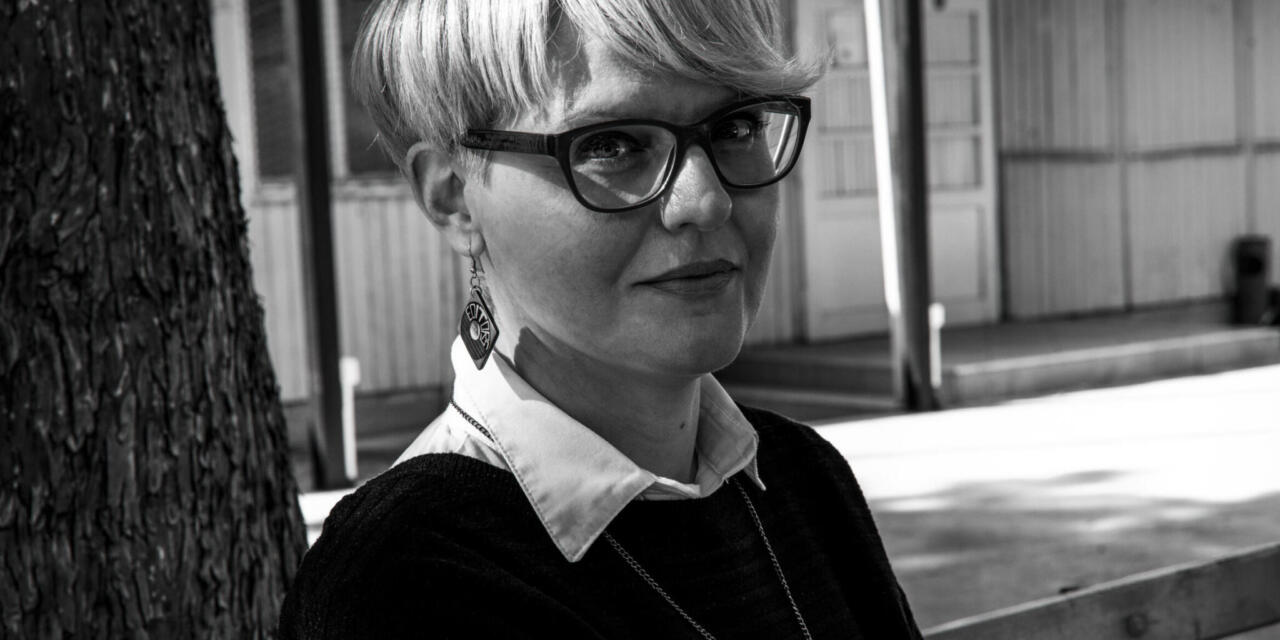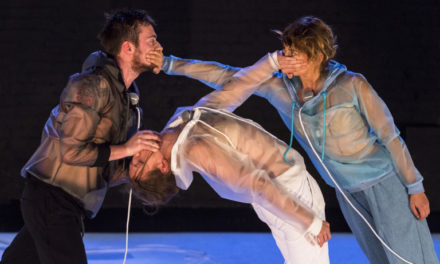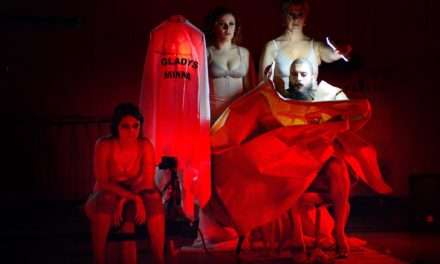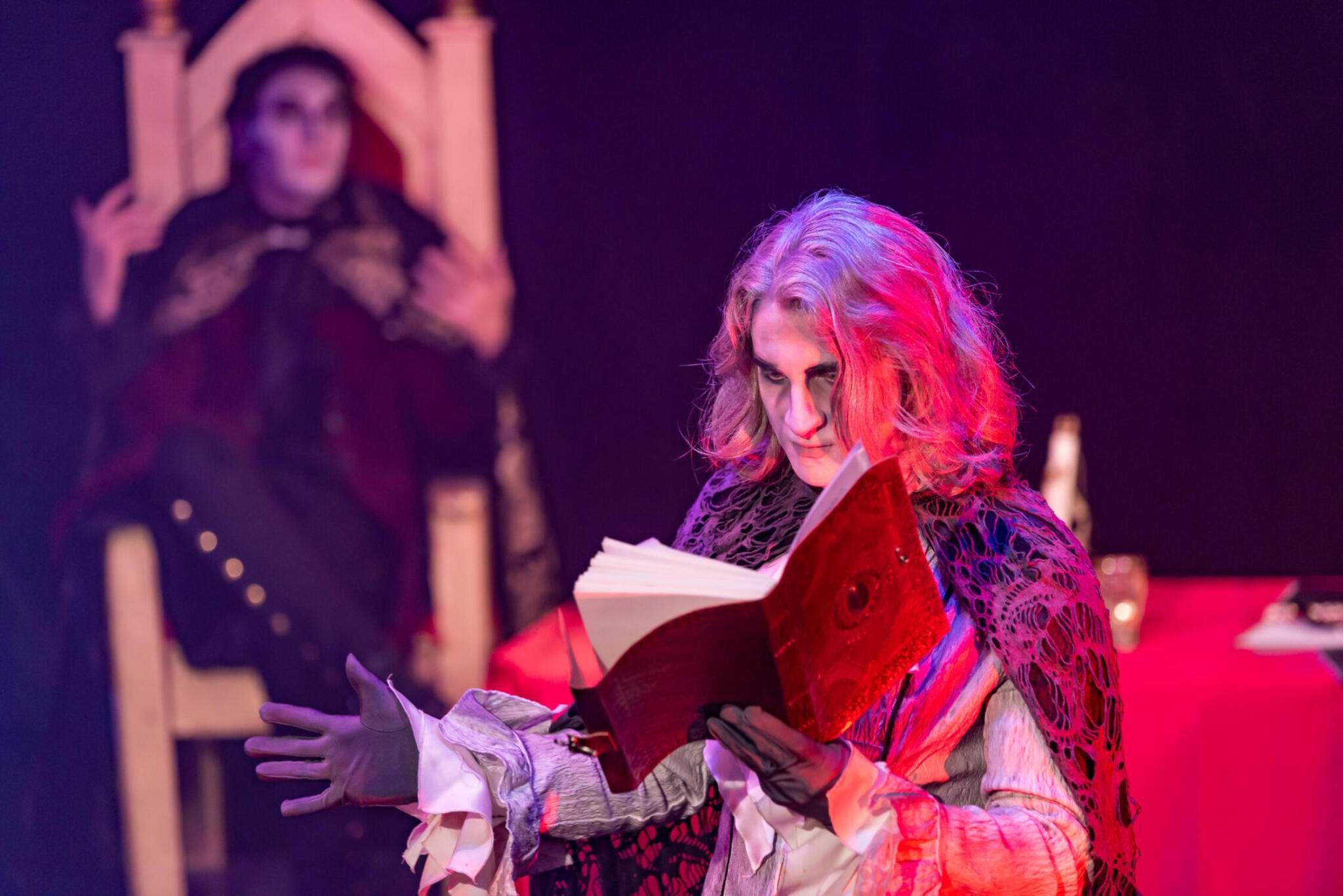Ana Stojanoska (1977, Prilep) is theatrologist, writer, and full professor at the Faculty of Dramatic Arts (FDA) in Skopje (teaches a group of subjects at all three degrees related to the theory and history of Macedonian and World drama and theater). Head of the doctoral studies program at the same institution.
She graduated General and Comparative Literature at the Faculty of Philology “Blaze Koneski” in Skopje (2001). She completed her postgraduate studies in Theatrology at the FDA, where she received her master’s degree (2003) and her doctorate (2007). She worked as a researcher and coordinator at the Institute of Theatrology at the FDA (2001 – 2011). Actively engaged in research and study of drama and theater. She specialized in theatrical museology.
Author of: We (novel, 2021, selected in the first three of the competition for unpublished novel Pegasus): Swan (novel,2021, Polica); Trogledalo (theatre play, 2020, published in the selection of EURODRAM: New Macedonian drama); Signature: Trepetlika (poetry collection, Tri and “Antevo Pero”, 2020, she received the Antevo Pero Award for 2020) Me and Lynn, after (novel, Blesok, 2016; she received the Racin Award, 2017 and was a finalist for Novel of the Year Award; Second Edition, Kultura, 2019), Dialogues in the Single (Culture, 2019), Theater – Challenge: Studies and Essays (UKIM, 2018), DimitarKjostarov – The Realistic Poetics and Aesthetics of a Director (Monograph, FDA, 2014 ) and Macedonian Postmodern Theater (monograph, FDA, 2006). Editor of: Plays by DejanDukovski (Proarts, 2002) and Contemporary Macedonian Drama (Mycenae, 2008). Her monodrama Glass Lamp was first produced by Theatra – Skopje, 2013. Author of hundred studies and essays published in Macedonian and foreign periodicals, as well as co-author of several theatrical monographs. She, also, writes theatre reviews. In 2019 she became a member of the Writers’ Association of Macedonia. She is a member of several associations and organizations focused on research in literature and theater. She wrote the lyrics for the album “Scream and Dust” (2019) with the musician SashkoKostov. Her poetry and prose has been published in several Macedonian and international journals. She writes constantly, not wanting to “mold” into any genre (scientific or literary), so she writes prose, poetry and theatre plays.
Ivanka Apostolova Baskar: Ana, from the perspective of an educator, lecturer, professor, researcher(witness and observer of new generations of students, future theater artists, in change and development), and as a spectator of theatrical performances, what are the advantages and disadvantages of contemporary theater in Macedonia– example: our national theaters today have a crisis with program profiling and vision?
Ana Stojanoska: As a theater admirer and devoted audience, first of all, then as a professor and researcher, from my many years of theatrical experience, I believe that as a culture we have great and creative theatrical potential. Contemporary theater today and not only today, perhaps since the beginning of the new millennium, in our country, is in a permanent crisis. I think the main problem is the system and the way of creating a theater. There is no theater strategy, there is no profiling of the repertory theater policy and not all theater artists are given the necessary and sufficient chance. The main problem is in the centralized source of finances that prevents theater managers from finding more creative solutions for financing and organizing theater production. We have great authors, directors, actors, costume designers and set designers, producers, choreographers, musicians, theatrologists, as individuals. And a dysfunctional system. A commission cannot decide on finances, usually politically composed, and not according to the only criterion – to be experts in their own field. The centralized financial source creates an imbalance in the creative production. I think that the crisis in program profiling will be leveled the moment we have a strategy. What does contemporary Macedonian theater mean today? What is the aesthetics and poetics of theater authors? What is the difference between a national theater and a stylized profiled theater? The work is very serious to be covered in just a few lines.
IAB: How do you assess the development, the rise of the independent scene in our country,
it is so fragile due to unstable cultural policies, which are in a state of constant instability, a fragmented positive incident, and a disappointing discontinuity?
AS: The independent scene is a reflection of institutional production. And that is so, everywhere and always. In our country, the independent scene, exceptions aside, depends on the financial center. What I want to emphasize is that we have excellent examples of independent theatrical productions – here I will list only some of them Artopia, Presvrt, Wonderland, …
Some time ago, I was doing a research on the independent scene in our country, from 1945 until today. There are always progressive and revolutionary independent theatrical performances in Macedonia. From Estrada 59 to the Theater at St. Nikita Goltarot, or from the Theater Workshop FF to “Worm” or “Lilith”, until today. It can be said that several important theatrical directions have been started by the independent scene. The most important thing we can do as a culture is not to “cut off the wings” of independent creatives.
IAB: Do young theater artists have a perspective working in domestic theaters (we have predominantly national theaters)?
AS: This is one of the problems. We have too many national theaters and too many employees not doing their job. Do not misunderstand me, one of my life maxims is – if you do your job well, and each of us does it in its own field, then we have no problem either as a society or as a culture. But, here we are all experts in everything and so we sink where we should not. Young authors (as a professor I am very proud of my students) are extremely creative and proactive. The theater needs that. People with attitude and people who think. But we all know how things go with us, who employs and how and how the whole organization happens. That is why whenever I have the opportunity I say, it is time to change things, give all young people a chance.
IAB: How much study, knowledge, and contacts gained at the Faculty of Dramatic Arts, Skopje are a guarantee for their further success when we do not have managers and talent scouts who regularly monitor students’ production, development, and capacity of new talent?
AS: The Faculty of Dramatic Arts – Skopje gives students a great opportunity to learn and find themselves in the theater and film arts of their choice. That’s the foundation and everyone gets a great foundation. However, it remains to their personal motivation to go further. That is why I, as a professor, insist, regardless of the program we study, in the last semesters to work on what is current in the contemporary world and domestic production. To show them where they will go and what they need to do to achieve more. But this is a big BUT, the problem with my answer to your first question is here. The world they enter opens the door to some, not to others. That is why the system is problematic. Because there are no agents or other type of scouts to watch these young people. And those who can do not do that. It is very rare for us to follow colleagues who work. See when you are in an audience, how rarely there are colleagues from other theaters who watch. That’s why I mix groups of students in my classes. I want them to get to know each other and cooperate even after graduation.
IAB: In the zenith of COVID 19 (2020, 2021) or for the last two years, our national theaters have been dormant (unlike artists around the world (who have found a whole host of alternatives to theatrical expression) and with the exception of rare domestic phenomena, who flirted or thoroughly tried out digital theater and film grammar – borrowed for dramatic, performing needs) – how would you assess this state of passivity?
AS: This is a topic I wrote about recently and referred to at an international conference. Great question. Some theaters responded immediately to the challenge. The National theater from Veles made the first step, then the Wonderland Theater, then the Presvrt, then the Spona (they will forgive me if I inadvertently forget some of them), new means of expression were discovered, the theater was set up on the Internet, some platforms were used. But the national theaters, except the one from Veles, seemed to have entered hibernation. For many different reasons, I would say, they chose the most painless side – passivity. Because the world’s great theaters have closed. Time and circumstances demanded it. Many health protocols, many unusual circumstances. I think it was mainly due to the difficulty in managing such large ensembles and the lack of well-organized working conditions in emergencies.
IAB: In 2022, we witnessed sudden creative and active theatre compensation, as a reaction to the previous passivity and excuse – the emergence of several independent and private theater troupes that worked brilliantly with several new premieres, with well-designed domestic and regional tours – guest appearances – the audience also started to wake up? What is your opinion?
AS: The pandemic showed us that it is difficult without theater, especially for us, to whom theater is our lifelong love. I think the audience needs theater. Yes, worldwide, the percentage of theater audiences is small, also in our country, but still there is an audience that wants to see theater. That is why theater managers have more responsibility today. To provide a theater that should again attract the audience to watch plays. All active theater troupes are to be welcomed, who in these circumstances also sought and discovered their own and new theatrical forms.
IAB: In Macedonia, until recently we had only three active and professional theatrologists, one of them Risto Stefanovski recently died, and you and Prof. Jelena Luzina remained active; Luzina who is retired, but remains relatively active. How do you solve the problem of lack of professional theatrologists – research teams that systematically (will) explore all the ups and downs, occurrences, styles, and novelties in the modern domestic theater?
AS: I will have to disagree that we are just a few theatrologists. Risto Stefanovski focused more on the theatrography and the history of theater. Theatrology covers the theory and methodology of theatrical research (among other subdisciplines) that was first introduced in the Macedonian theater by Professor Jelena Luzina. In 1999, when the Institute of Theatrology started operating under her leadership, the process of educating theatrologists began. There are more PhDs and masters as well. My colleague Sonja Zdravkova Dzeparoska is a great example of a successful theatrologist who deals with dance and performing arts. My colleague Michel Pavlovski from the Institute of Macedonian Literature as well. There are more of us and the number is increasing every day. I am personally engaged in solving this potential problem by organizing scientific conferences, managing the doctoral studies at our faculty, as well as motivating younger colleagues to engage in this incredibly creative science.
IAB: You are one of the mentors of the MKC project-Gledaj.mk, intended for the professional development of theater and film criticism in our country? What are the results and feedback from this training? Who are the promising young theater critics you could single out, and do you see that they will remain consistent in this professional direction?
AS: Gledaj.mk is a great platform, the first of its kind that offers to everyone who is interested to send a review. In addition, we went through two cycles of workshops and new opportunities for writing criticism (film and theater) opened up. But here it is again, that but, we as a society should know that criticism is an adequate participant in the theatrical process. That is why more criticism should be written, opportunities should be given for publication and serious criticism and critics should be appreciated. There are several well-profiled critical voices on the platform, I recommend reading them. The idea is to work with FDA postgraduate students who have an elective course in theater criticism and through the platform to help and motivate them to pursue theater and write theater criticism.
IAB: Back to FDА – many professors have retired, what are the novelties in terms of new subjects, professors, and assistants of the Departments of Theatrology; Acting; Theatre Directing, and Dramaturgy with Creative Writing?
AS: We are up to date with the new accreditation that should start in the new school year. Of course, the retirement of older colleagues is a natural process for which we are grateful. Unfortunately, we do not have many opportunities for new employment, that is what hinders us. It is still at the state level. I personally have been looking for an employment for my assistant for several years, because I think we should have more younger staff that will help us all to be more successful. As for the new program, I know that each of us has worked hard to bring students the latest knowledge of science and the arts we teach.
IAB: For the contemporary domestic drama, which we manage to follow with great difficulty staged in theaters, what are your remarks on names, styles, themes and their relevance today? Why do contemporary directors avoid staging domestic contemporary authors other than the older plays of Dejan Dukovski and Goran Stefanovski?
AS: There are several reasons, they do not know them, they do not want to meet them, they are comfortable in the classics and what they know. Not enough texts are read. In all world theaters, there are dramaturgs who read and discover new authors. But not in our theatres. Again, politics, society and the way theaters are organized hinder that. We have excellent authors besides Dukovski and Stefanovski. There were various attempts to open theaters for new texts from competitions to rehearsals and here we stop. And we have great new authors. We just need to give them a chance. I think that due to the theatrical and dramatic heritage, our new young authors have a huge opportunity to create unique genres and to play not only on ours but also on the world stages.
IAB: In your opinion, why is Macedonia one of the few countries in Europe that still does not have a National Association of Dramatic Artist/Theater Artists and Workers?
AS: The sole reason is mentioned several times in my answers. Instead of us having a strategy and vision for the Macedonian theater and culture, we are resolving personal frustrations. We had a domestic drama festival that no longer has an identity. For there to be an association, there must be a vision and trust in those who know the subject matter. We always have close circles of personal acquaintances and malicious petty bourgeois “it belongs to me” kind of mentality and relations. If I know that a director, theater, playwright, critic, or any other theater artist knows what she or he is doing, I will not obstruct them. On the contrary, I will directly create the necessary network. Unfortunately, this is not our experience. From just a simple look at what production and reception are, you will immediately notice the groupings. As long as that is considered “normal” things will not change.
IAB: What is your vision or assumption for the future of contemporary home theater (educational and productional), in which direction will modern productions and institutional conditions move? How will we solve the problems within the domestic theater community, in order to achieve international relevance, visibility, and competition?
AS: The first rule is to get out of the comfort zone. To explore ourselves, our culture, our attitude towards the world. Let’s write about what others are silent about. Let’s reconsider. Modern theatrical production is of course up to date with the global one. But when they base their personal and collective tradition and build a modern manuscript on it, world success is guaranteed. We have examples of that with Chashule and Stefanovski and Dukovski. In the 90s we had a great example of how to make a current, fresh, daring theater.
IAB: Ana, among other things, you are an active and award-winning prose writer and poet, you have also published dramatic texts, how do you balance, improve and manage your professional identities?
AS: The same way I treat all people, by giving them complete freedom. At the core of all my identities is a love of art. The urge to write and tell stories is my main one and then it only branches into the different genres that I write. By realizing our own possibilities, each of us has to explore what we can and how we can contribute more. It is a personal challenge for me, to “fight” with myself, as much as I can when it comes to literature, theater, and music. I write constantly, that is the advice I received from my second father, the famous writer Kole Chashule, so you manage to make the best possible prose, poetry, drama, theory, criticism and so on. The beauty is that we can do whatever we want, only if we discover in time what we want. And the theater offers that to us.
Thank you very much Ana.
(Skopje, 2022)
This post was written by the author in their personal capacity.The opinions expressed in this article are the author’s own and do not reflect the view of The Theatre Times, their staff or collaborators.
This post was written by Ivanka Apostolova Baskar.
The views expressed here belong to the author and do not necessarily reflect our views and opinions.


















